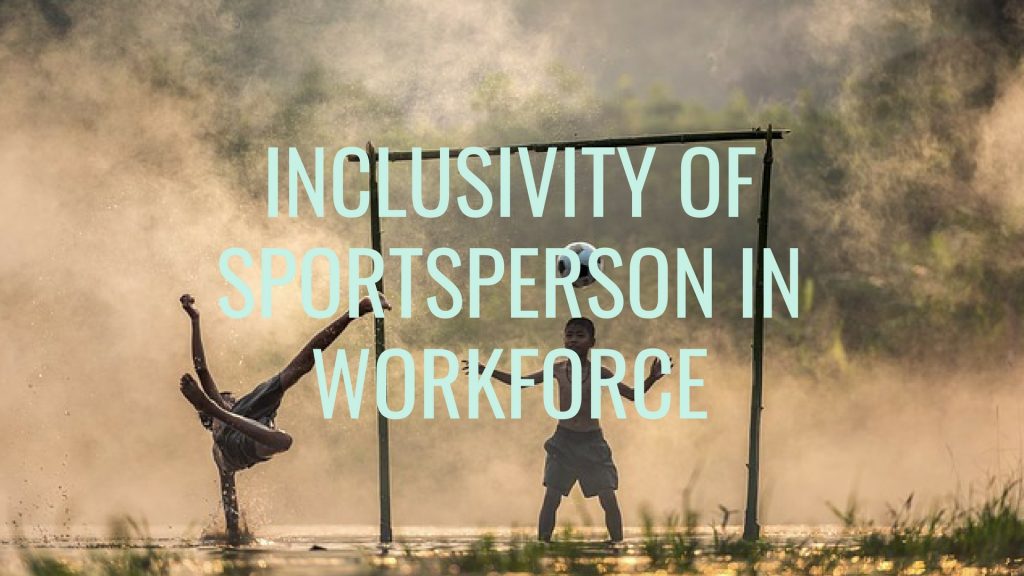Integration of sportspersons is successful only if they are able to play a meaningful role in the organisation.
Corporates have always supported sportsperson through sponsorships and that has been from a brand marketing perspective. However, there have been little efforts to make them part of the mainstream workforce and include them in the diversity agenda.
Yes, corporate honchos agree that sportspersons have several leadership qualities, such as the ability to get things done, to think ahead of competition and expect the unexpected. They have the inherent quality to leverage the unique and complementary strengths of their team members. They understand well that playing down or not respecting a team member can lead to organisational failure.
The irony is that despite such realisation, corporates haven’t done enough to include them in the workforce.

A sportsperson should not appear as an ornamental piece. Unless you integrate them into the system and make them do something meaningful, it may not serve any purpose.
“Sportspersons bring a cultural change and help build a sports leadership culture in terms of discipline and delegation of role. They also introduce a coaching and mentor culture. In a volatile business environment, one can learn to be a good loser or a gainful winner. It’s good to have this kind of diversity,” opines Anshul Bhargava, chief people officer, PNB Housing Finance.
Probably, corporates do not realise that not every sportsperson becomes a celebrity. There are sports enthusiasts who probably make it to the state or district level and do not have a career after that. It is important to give them preference and make them part of core workforce.

Sports is a way of creating team spirit, both within and between functions. If sports can become a way of life then it can definitely add to the diversity and bonhomie, and also improve team collaboration
Most HR leaders that HRKatha spoke to had reservations regarding the effectiveness of including sportsmen in their diversity agenda. It’s true that they can set an example for other employees if their achievements are demonstrated well in the organisation but jobs have to be aligned to their capabilities.
“Only if companies are able to find suitable assignments for these sportspersons, in line with their strengths, can they serve some purpose,” says an HR leader.

At Tata Power, candidates with sports background get precedence over other contenders in our campus placements. One out of five of our new hires are sports enthusiasts.
“The sports quota system in public services has not been much of a success because such employees tend to get lost in the system. Unless the integration is successful, these employees forever hold it against the system for hiring them through quotas,” opines SV Nathan, partner and chief talent officer, Deloitte India.
“Corporates are currently focusing more on employing people from armed forces because of their leadership quality. Sportspersons also have tremendous value but individual sport is different from group sport. A sportsperson should not appear as an ornamental piece. Unless you integrate them into the system and make them do something meaningful, it may not serve any purpose,” he adds.

Sportspersons bring a cultural change and help build a sports leadership culture in terms of discipline and delegation of role. They also introduce a coaching and mentor culture. In a volatile business environment, one can learn to be a good loser or a gainful winner. It’s good to have this kind of diversity.
Now there is one company that claims to give impetus to sports enthusiasts in hiring. Tata Power claims that one out of five of its new hires are sports enthusiasts.
“It adds a different ability to succeed at the workplace as sports have been a great source of formulation and execution of strategies and corporates have drawn lessons from sports. Having a section of people from sports also create a sense of pride for co-workers. Candidates with sports background get precedence over other contenders in our campus placements,” says Jayant Kumar, CHRO, Tata Power.
HR leaders also agree on the importance on sports. This is why most companies encourage employees to indulge in sports to inculcate certain qualities. “Sports is a way of creating team spirit, both within and between functions. If sports can become a way of life then it can definitely add to the diversity and bonhomie, and also improve team collaboration,” says Hari TN, head-HR, Big Basket.
“The answer is to find the right talent at a young age, nurture it through sponsorship and take care of it with a long-term perspective. This will ensure that companies get engaged employees who will be associated with the brand throughout their lives. It can help create something meaningful for the businesses as well,” says Bhargava.
HRKatha believes that companies need to drive the diversity agenda by integrating sportspersons. It’s their job to find the right fit and the apt role for the sportsperson.



